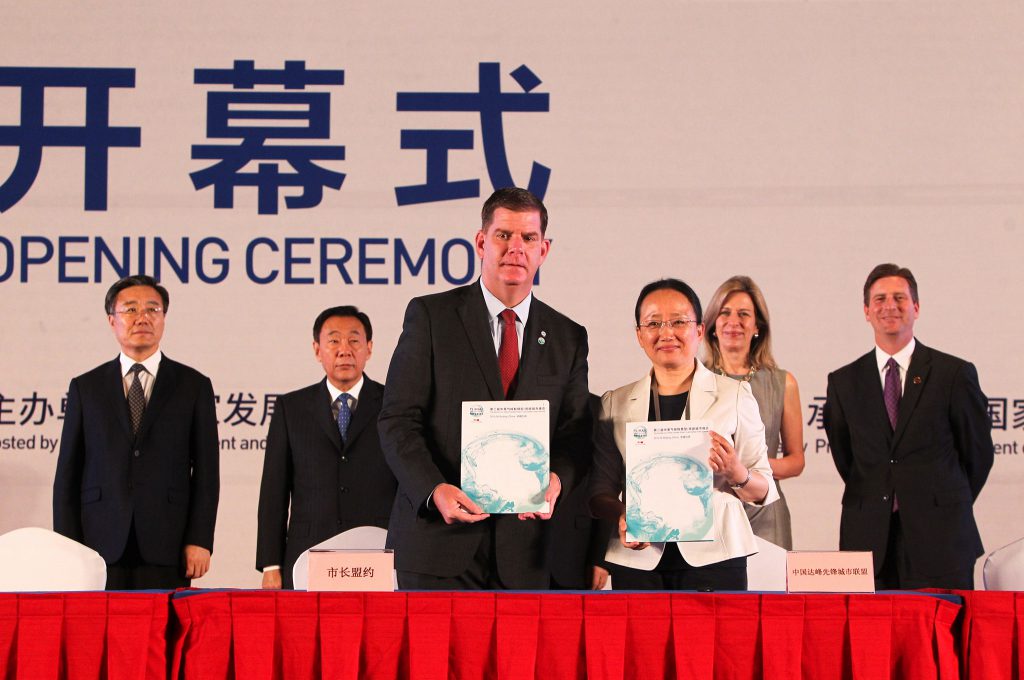City Action at the 2nd US-China Climate Leaders Summit in Beijing

By Ailun Yang, Bloomberg Philanthropies Environment Team
This week I had the pleasure of joining Bloomberg Philanthropies’ partners and sixteen U.S. Mayors and city representatives in Beijing, China at the second U.S.—China Climate Leaders Summit. Throughout the two-day Summit, Bloomberg Philanthropies and our partners highlighted the important role cities play in combating climate change through a series of new partnerships, research and initiatives.
Cities account for most of the world’s carbon emissions, but they are also the source of the greatest opportunities for action. This is especially true in China where more than 1 billion people are expected to live in its cities by 2030. By bringing together cities from both China and the United States, the Summit enabled the sharing of best practices and new solutions.
New Partnerships
The global climate challenge is increasingly complex and no country, city or mayor can solve it alone. At Bloomberg Philanthropies, we work to bring together resources and partners from across sectors and countries to amplify impact.
In an exciting opening session, the Compact of Mayors and the Alliance of Peaking Pioneer Cities of China (APPC) announced a new partnership. Sharing similar goals, the efforts of these two city networks will be accelerated by working together. The Compact of Mayors, launched in 2014 through Mike Bloomberg’s role as UN Secretary-General’s Special Envoy for Cities and Climate Change, is a network of over 500 global cities. The APPC is a network of 40 Chinese cities working to peak emissions. With their newly formed partnership, together these two networks will set climate targets and measure progress.
In addition to the new partnership between the Compact of Mayors and APPC, the cities of Dalian and Chengdu joined the C40 Cities Climate Leadership Group (C40), a network of the world’s megacities committed to addressing climate change. Dalian and Chengdu’s entry to C40 brings the number of C40 cities to 85, representing more than 650 million people worldwide. Nine Chinese cities are now members of C40: Beijing, Chengdu, Dalian, Guangzhou, Hong Kong, Nanjing, Shanghai, Shenzhen and Wuhan.
New Research
With the Green Finance Committee of the China Society for Finance and Banking, we released a new research report, called the Green Finance for Low-Carbon Cities, which outlines a path forward for Chinese cities to attract private funding for building, transport and clean energy projects that reduce emissions and protects public health.
The report was released at the Summit and the topline findings were discussed in detail in four panels. Bringing together environmental and finance experts for the first time ever, it is estimated 6.6 trillion yuan, about 1 trillion USD, will be needed to finance low carbon buildings, transportation and clean energy in Chinese cities before 2020.
New Initiatives
During U.S. Secretary of State John Kerry’s closing remarks, he announced the second Our Cities, Our Climate Exchange with Bloomberg Philanthropies. Following the success of the Exchange in the fall of 2015, Bloomberg Philanthropies and the U.S. Department of State will once again bring together urban sustainability directors from throughout the world for a 10-day study tour in the U.S.
Similar to the effort of the Summit this week in Beijing, the Our Cities, Our Climate Exchange will encourage the sharing of best practices at the subnational level and in partnership with national government.